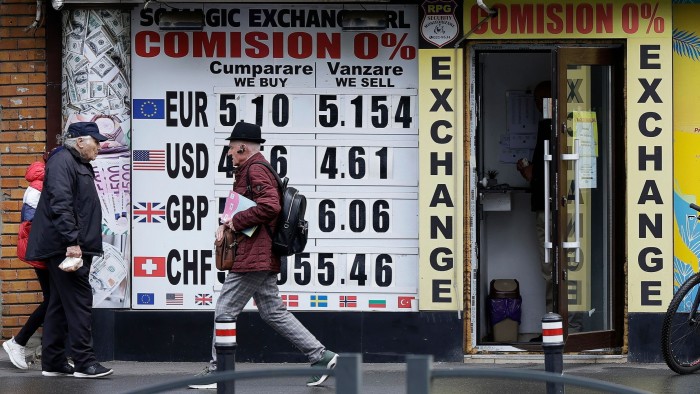Investors are bracing for further turmoil in Romanian markets following a recent dramatic sell-off, as presidential elections this weekend cast uncertainty over how the country will tackle the biggest national budget deficit in the EU.
Bonds and currency investors are positioned for the country to lose its investment grade status and for another drop in the leu against the euro, after a presidential run-off on Sunday that could elevate far-right former football hooligan George Simion to the helm of the front-line Nato state.
The ultranationalist, who is running against the pro-EU centrist mayor of Bucharest Nicuşor Dan, won the first round this month.
That led to the collapse of the government, whose candidate failed to make the presidential run-off for a second straight election, and the resignation of prime minister Marcel Ciolacu.
Investors are now preparing for months of uncertainty over how a new government will cut a budget deficit that ballooned to more than 9 per cent of GDP last year.
Both presidential candidates have promised action to cut the deficit and rein in debt, but there is little clarity as to how their plans will work.
“The longer it takes for us to see that these urgent and necessary fiscal reforms are taking place, the more risks there are,” said Yerlan Syzdykov, a portfolio manager at Amundi who owns Romanian bonds.
In the home stretch of the campaign, polls show the candidates to be neck-and-neck.
It will be up to the new president to pick a prime minister and steer the parties to form a new government. In the unprecedented event of two failed attempts to find a majority, Romania may hold snap elections.
“The market has priced in a proportionate chance of a Simion victory, but has not fully priced that in yet,” said Kathryn Exum, co-head of sovereign research and strategy at emerging market specialist Gramercy Funds Management. Markets are reflecting a “high level of uncertainty on the fiscal path”, whoever wins, she added.
The leu tumbled 2.8 per cent in the days following the first round result. The country’s central bank has already spent at least €5bn over the past week on stemming the sell-off, according to analyst estimates.
Investment-grade status, meanwhile, is hanging by a thread and will be lost if two of the three big credit rating agencies opt to junk Romania after the election. Its debt already trades more cheaply than other big investment grade-rated emerging market countries.
While Romania’s debts are still less than two-thirds of GDP, it has increasingly relied on international investors to fund fiscal shortfalls in recent years.
Simion has promised policies that could cost billions of euros — such as state-backed cheap housing, a zero-interest loan relief programme and nationalising energy companies — but with no clear funding for them. Dan has pledged to end tax evasion, better tap EU funds, cut public sector spending and review large, inefficient state companies.
“Recently, capital outflows have increased significantly,” the central bank said on Friday, adding that this has had “a major impact” on the value of the leu.
“Increased uncertainties are associated with the future conduct of fiscal and revenue policies, including in the current domestic political context,” it added.
With about €56bn at the start of the year, foreigners now own more Romanian debt than they do of Poland, an economy more than twice the size, UBS analysts said. They estimate that forced selling by funds that are not allowed to own junk debt “could be in the €10bn to €20bn range” if there is more than one downgrade.
“There is a risk that the foreign investors do not trust the new Romanian administration [and] leave Romania,” Dan, a political independent, told the Financial Times. “But I’m very, very optimistic that Romania will choose the rational change.”
The new president and government also face the immediate pressure of negotiations over access to EU funds, which could be pulled without a fiscal plan in place.
Romania has so far issued about €7bn of roughly €15bn in international bonds it intends to sell this year, an amount that assumes fiscal restraint compared with last year but which will leave it exposed to higher borrowing costs if bond prices fall after the election.
“Even in a Simion victory, there is need and an incentive for them to find a way to consolidate eventually,” Exum said.
Despite Romania’s economic growth in recent years, “only the GDP is bigger”, Simion told the FT. Romanians “are poorer and poorer because of the energy crisis, the war in Ukraine, the Green Deal, the way we were closing our economy in the Covid period”.
A further fall in the leu would add to strains on Romania’s public finances, given a significant share of debt is denominated in euros. Forward bets on the currency are pricing in 5.4 to the euro in a year’s time, compared with 5.1 currently.
Investors and analysts estimate that following this month’s intervention, the central bank has around €65bn left in reserves, although it also needs to cover imports and debt payments.
“The central bank has the ammunition to defend the leu if capital outflows were to persist, but it cannot support the currency indefinitely,” said Liam Peach, senior emerging markets economist at Capital Economics.
The central bank will wait for the political cycle to play out, but whoever wins will have to face the same economic situation, Amundi’s Syzdykov said. “Reality will bite once Simion is in power, if that is the eventuality.”
https://www.ft.com/content/efd0466e-4fed-40df-9cc2-0e0cbe37314e


